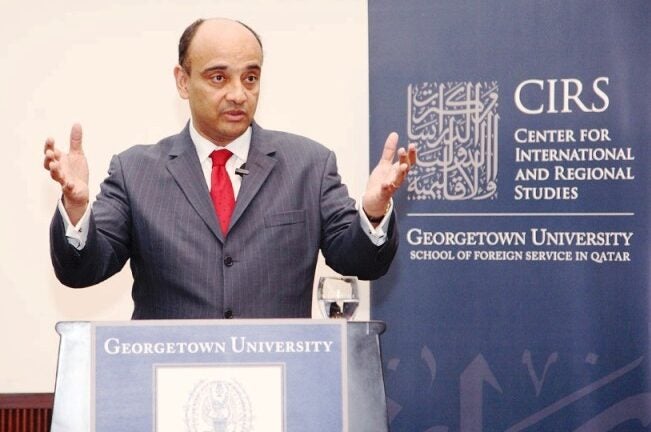American Studies, Dialogue Series, Regional Studies
Anthony Appiah Lectures on Ideas of Cosmopolitanism

On January 23, Kwame Anthony Appiah, Professor of Philosophy at Princeton University, delivered the first CIRS Monthly Dialogueof 2012 titled, “Being a Citizen of the World Today.” Appiah’s lecture was centered on the question of global citizenship and how historical intellectual theories of “cosmopolitanism” have a bearing on how people live their lives in the contemporary world. Appiah pointed out that the etymology of the word “cosmopolitan” is derived from the Greek “kosmos” meaning “world” and “polites” meaning “citizen,” and so “cosmopolitanism” literally means a “citizen of the world.” Taking the audience on a journey back to ancient Greece, Appiah relayed how current understandings of cosmopolitanism are inherited from ancient Greek political philosophy.
Appiah recounted that Diogenes, a philosopher and founder of the Cynic movement, was the first known European to ever look beyond the borders of the ancient Greek Empire to claim that he was a citizen of the world. Appiah explained that this statement made by Diogenes is a metaphor for tolerance of otherness and does not necessarily mean that Diogenes favored a single world government, which is precisely what Alexander the Great was attempting to do at that time through his project of world conquest and domination. People can think of themselves as fellow citizens and can care about the fate of their fellow human beings even if they are not members of a single political community. “Cosmopolitanism believes that every human being matters and that we have a shared obligation for one another,” he said.
Diogenes’ idea of cosmopolitanism entered Western philosophical traditions through the Stoics and has survived to this day through Christian and Islamic traditions that emphasize a spiritual affinity between all human beings. Similarly, the intellectual core of European enlightenment was based on the idea of global concern for humanity, without advocating a centralized world government. With the rise of Westphalian ideology, the idea of the nation state was consolidated through common cultural and linguistic affiliations between the people of a single geographical area. Although calls for national unity and homogeneity are always strong, Appiah noted that they are not all encompassing and there will always be diverse groups of people living in a single country. “Different communities are entitled to live according to different standards because human beings can flourish in many different kinds of society and because there are so many values worth living by,” Appiah said.
Because cultural diversity is a condition of the world, “conversation across identities, religions, races, ethnicities, and nationalities is worthwhile, because through conversation, you learn from other people with different, perhaps even incompatible, ideas from your own,” Appiah argued. As such, today’s globalization has made the ancient ideal of cosmopolitanism even more relevant; an individual can reach millions of international others through communications technologies and global media and economic systems.
As a final thought, Appiah explained that cosmopolitanism is an empowering concept and one that forms the basis of mutual respect for oneself and for others. He concluded that “if people were to manage their own lives, which is what they are responsible for, then they need the powers to do so. And the closer the powers are to people, and to small communities of people, the greater the control they can have over the shaping of their lives.”
Kwame Anthony Appiah joined the Princeton faculty in 2002 as Laurance S. Rockefeller University Professor of Philosophy and the University Center for Human Values. His current interests range over African and African-American intellectual history and literary studies, ethics and philosophy of mind and language; and he has also taught regularly about African traditional religions. Professor Appiah was educated at Clare College, Cambridge University, in England, where he took both B.A. and Ph.D. degrees in the philosophy department.
Article by Suzi Mirgani, CIRS Publications Coordinator